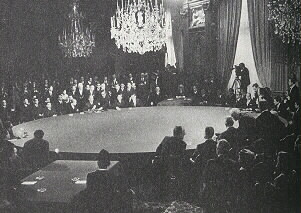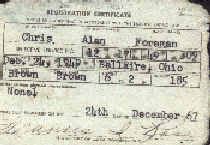The Peace talks


my draft card | At the biginning of the 70s, I remember the Paris Peace Talks dragging on forever. Would Peace in Viet Nam never come?
My draft lottery number was chosen in 1969 (it was 95) and I sweat out the draft for three years in college. After graduation in June of 1972, I was drafted into the Army of the United States in July. Fortunately, by that time, I was already accepted into the Peace Corps. My appearance for induction was postponed for two years while in Peace Corps service. Things happened fast. I arrived in Korea in November of 1972, the bombing of Cambodia and Hanoi began in ernest in December, and by January there was a peace. As Nixon would say "Peace with Honor". In March or so, I got a notice from my local draft board saying that my induction was indefinately postponed. That's the last time I heard from them. The end of the war in Viet Nam was very real to me. Why did it take so long? In an ironic twist, I joined the Army in 1976. |
A chronology of events in Viet Nam
- 1957 Beginning of communist insurgency in South Vietnam
- 1959 Weapons and men from North Vietnam begin infiltrating the South
- 1960 US aid to the South Vietnamese president, Ngo Dinh Diem, increased
- 1962 President John F Kennedy provides US military advisers to South Vietnam (12,000 by end of year)
- 1963 Viet Cong, the communist guerrillas operating in South Vietnam, defeat units of ARVN, the South Vietnamese army. President Diem overthrown
- 1964 North Vietnamese patrol boats fire on the US destroyer Maddox in the Gulf of Tonkin, triggering start of US bombing raids on North Vietnam
- 1965 US troops in Vietnam number 23,000 at start of year
- 1966 400,000 US troops in Vietnam, rising to 500,000 in 1967
- 1968 Tet Offensive - a combined assault by Viet Cong and North Vietnamese army on US positions - begins. More than 500 civilians die in My Lai massacre
- March 31 1968 President Lyndon Johnson (below right) announces on television that bombing north of the 20th parallel will stop and that he will not seek re-election in the fall. Hanoi responds by de-escalating its insurgency efforts, and in October Johnson orders total halt to bombing. US and Hanoi agree to preliminary peace talks in Paris
- 1969 President Nixon draws back US ground troops from Vietnam
- 1970 Nixon's national security adviser, Henry Kissinger, and Le Duc Tho of the Vietnamese politburo start talks in Paris
- 1973 Ceasefire agreement. Withdrawal of US troops completed by March
- 1975 North Vietnamese troops invade South Vietnam and take control of the whole country after South Vietnam surrenders
- April 1975 Last members of US embassy staff evacuated by helicopter from roof of embassy
|

